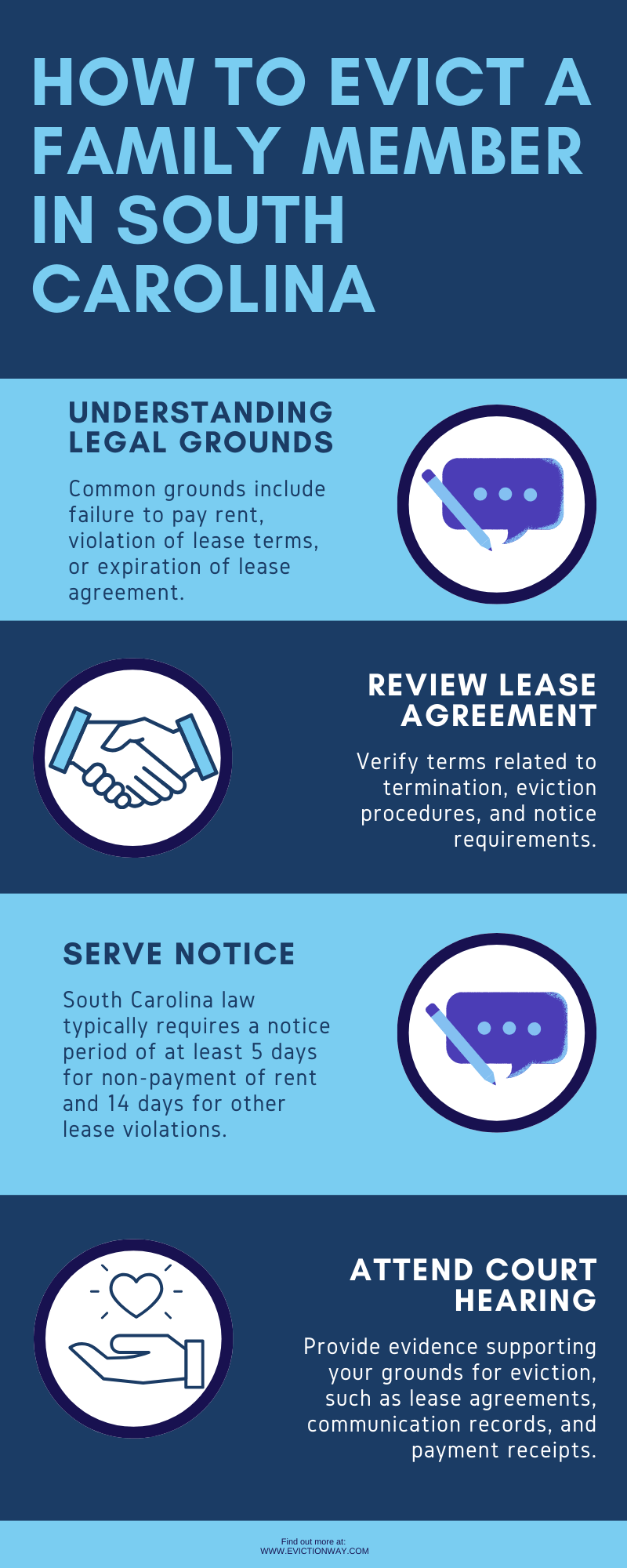Evicting a family member can be a difficult and emotional process, but it may be necessary to protect your rights and property. In this article, we will discuss how to evict a family member in South Carolina. We will share the best way to evict a family member in South Carolina, and we will tell you the method to evict them.
We will also share tips on removing a family member politely, the laws involved, and legal tips. Evicting a family member can be a difficult process, but it is important to remember that you have rights. If you are being harassed or threatened by a family member, you should contact the police. You may also want to consider getting a restraining order.
If you are considering evicting a family member, it is important to seek legal advice. An attorney can help you understand your rights and options, and can help you through the eviction process.

How To Evict a Family Member In South Carolina
Evicting a family member can be a difficult and emotional process. However, it is important to remember that you have the right to protect your property and your rights as a landlord. If you are considering evicting a family member, it is important to follow the proper legal procedures.
1. Give Proper Notice
The first step in evicting a family member is to give them proper notice. In South Carolina, you must give the tenant at least 30 days’ written notice to vacate the property. The notice must state the reason for the eviction and the date by which the tenant must vacate the property.
2. File a Complaint with the Court
If the tenant does not vacate the property after receiving the notice, you will need to file a complaint with the court. The complaint should state the reason for the eviction and the steps you have taken to resolve the issue.
3. Attend a Hearing
Once you have filed a complaint, the court will schedule a hearing. At the hearing, you will have the opportunity to present your case to a judge. The judge will then make a decision on whether or not to evict the tenant.
4. Obtain a Writ of Possession
If the judge rules in your favor, you will be issued a writ of possession. This document gives you the legal authority to remove the tenant from the property.
5. Enforce the Writ of Possession
Once you have obtained a writ of possession, you can have the tenant removed from the property by a law enforcement officer.
6. Change the Locks
Once the tenant has been removed from the property, you should change the locks to prevent them from re-entering.

Evicting a family member can be a difficult process, but it is important to remember that you have the right to protect your property and your rights as a landlord. By following the proper legal procedures, you can evict a family member without causing further damage to your relationship.
Additional Resources for South Carolina eviction help:
Eviction notice South Carolina
In South Carolina, Eviction notice indeed serves as a legal document that landlords can utilize when tenants breach their lease agreements.
This notice essentially notifies tenants that they rectify the violation or vacate the premises. It’s a crucial step in the eviction process and provides tenants with a final opportunity to resolve the issue before further legal action is taken.
You can download Eviction notice South Carolina here.
How Much Does it Cost to Evict a Family Member in South Carolina?
The cost of evicting a family member in South Carolina can vary depending on several factors, including the county in which you live, the complexity of the case, and whether you hire an attorney.
| Expense Category | Estimated Cost ($) |
|---|---|
| Filing fee | $45 |
| Service of court summons by sheriff | $10 |
| Service of writ of ejectment | $10 |
| Notice of appeal filing fee | $150 |
| Legal fees | $500-$10,000 |
| Average locksmith fees | $160 |
The process of evicting a family member can be emotionally challenging, so it’s important to seek professional help if you’re not sure how to proceed. An attorney can help you understand your rights and options and can represent you in court.

FAQs: Evicting a Family Member in South Carolina
Here are some of the most asked questions.
What are the grounds for evicting a family member in South Carolina?
In South Carolina, you can evict a family member if they have violated the terms of their tenancy, such as not paying rent or breaking the lease. You can also evict a family member if they are causing a disturbance or posing a threat to your safety or the safety of others.
What is the process for evicting a family member in South Carolina?
The process for evicting a family member in South Carolina is similar to the process for evicting any other tenant. You must first give your family member a written notice to vacate the premises. The notice must state the reason for the eviction and the date by which your family member must leave. If your family member does not leave by the deadline, you can file an eviction lawsuit with the court.
Can I evict a family member who is not on the lease?
Yes, you can evict a family member who is not on the lease. However, you must be able to prove that the family member is a tenant. This can be done by showing that the family member has been living in the premises for a period of time, has been paying rent, or has otherwise acted like a tenant.

What are my rights as a landlord when evicting a family member?
As a landlord, you have the right to evict a family member if they have violated the terms of their tenancy or are causing a disturbance. You also have the right to file an eviction lawsuit with the court if your family member does not leave by the deadline.
What are my options if I am a family member being evicted?
If you are a family member being evicted, you have several options. You can try to negotiate with your landlord to stay in the premises. You can also try to find another place to live. If you are unable to do either of these things, you may need to seek legal assistance.
Related:
How to Evict a Family Member in New Mexico
